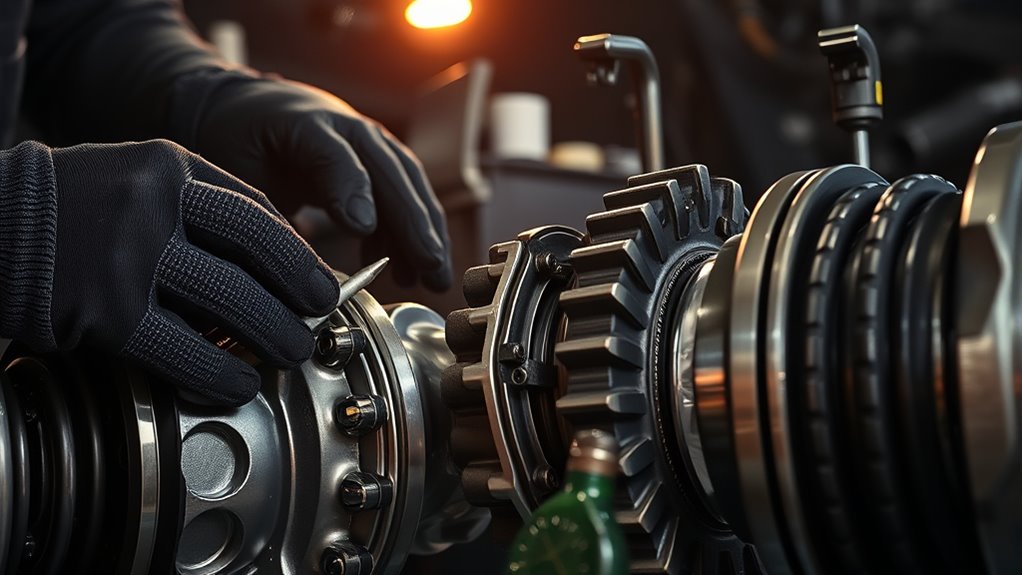To keep your differential and transfer case running smoothly, regular service is essential. This involves inspecting gear oil levels, checking for contamination or wear signs, and changing the oil when needed. Proper lubrication reduces friction, prevents damage, and extends component life. If you notice unusual noises or handling issues, it’s time for maintenance. Keep your vehicle performing at its best by ensuring these systems are well-maintained—continue to learn more about how to do it right.
Key Takeaways
- Regularly inspect and top off gear oil levels in both differential and transfer case.
- Change gear oil when it appears dark, gritty, or smells burnt to prevent component wear.
- Use manufacturer-recommended gear oil to ensure proper lubrication and performance.
- Check for signs like unusual noises, vibrations, or handling issues indicating service needs.
- Perform periodic flushing and cleaning to remove contaminants and extend component lifespan.

Your vehicle’s differential and transfer case are vital components that transfer power to your wheels and help your vehicle handle different driving conditions. Maintaining these parts ensures smooth operation, prevents costly repairs, and extends your vehicle’s lifespan. One key aspect of proper maintenance is regularly checking and changing the gear oil. Gear oil lubricates the gears inside the differential and transfer case, reducing friction and preventing wear. Over time, gear oil can become contaminated with metal shavings, dirt, and moisture, which diminishes its lubricating properties. If you notice unusual noises, vibrations, or difficulty turning, it’s a good sign that your gear oil may need replacement.
Regularly check and change your differential and transfer case gear oil to prevent damage and extend vehicle life.
When it comes to repair procedures, addressing issues in your differential or transfer case isn’t always straightforward. If you suspect a problem, start by inspecting the gear oil. This typically involves removing the fill plug and checking the oil’s color and consistency. Fresh gear oil should be clear or slightly amber and free of debris. If it appears dark, gritty, or smells burnt, it’s time to change it. Flushing and replacing the gear oil is a common repair procedure to restore proper lubrication and prevent further damage. Depending on your vehicle, this may involve draining the old oil, cleaning the housing, and refilling with the manufacturer-recommended gear oil. Regular maintenance and timely repairs are vital to keep your differential and transfer case working at their best. Don’t ignore signs of trouble, and make a habit of checking your gear oil periodically. This simple step can save you from costly repairs down the line and keep your vehicle running smoothly in all driving conditions. Additionally, using the correct gear oil type specified by your vehicle manufacturer can significantly improve the lifespan and performance of these components.
Frequently Asked Questions
How Often Should I Service My Differential and Transfer Case?
You should service your differential and transfer case every 30,000 to 60,000 miles. During these services, you’ll replace the differential fluid and transfer case oil to keep your components running smoothly. Regularly checking these fluids helps prevent damage and costly repairs later on. If you often drive off-road or tow heavy loads, consider servicing them more frequently to guarantee peak performance and longevity of your vehicle’s drivetrain systems.
Can I Drive With a Leaking Differential or Transfer Case?
Driving with a leaking fluid from your differential or transfer case is like sailing with a tiny leak in your boat—eventually, it risks sinking. You shouldn’t drive with a leak, as it compromises drive safety and can cause severe damage. Leaking fluid means essential parts aren’t lubricated, leading to overheating and failure. It’s best to stop and get it checked immediately, ensuring your vehicle stays reliable and safe on the road.
What Are Signs of a Failing Differential or Transfer Case?
You’ll notice signs of a failing differential or transfer case through gear oil symptoms like a strong, burnt odor or metal shavings in the fluid. Unusual noises, such as whining, grinding, or clunking when shifting or turning, also suggest trouble. If you experience difficulty engaging gears or vibrations during driving, these are further clues. Address these issues promptly to prevent further damage and ensure your vehicle stays safe and reliable.
Is It Necessary to Replace Both at the Same Time?
Like a symphony requiring harmony, replacing both your differential and transfer case isn’t always necessary unless they’re both failing. You should follow your vehicle’s maintenance checklist and consider their current condition. If one shows signs of wear, inspect the fluid type and level, then decide if the other needs servicing too. Regular maintenance helps prevent costly repairs, but simultaneous replacement is only needed if both components are compromised.
How Much Does Differential and Transfer Case Service Typically Cost?
The cost estimates for differential and transfer case service usually range from $200 to $400, depending on your vehicle and location. Regular service intervals, often every 30,000 to 60,000 miles, help prevent costly repairs. You should plan to have these services performed when recommended to keep your vehicle running smoothly. Keep in mind that neglecting these services can lead to more expensive repairs down the road.
Conclusion
Regularly servicing your differential and transfer case keeps your vehicle running smoothly, preventing costly repairs down the road. Did you know that neglecting these components can lead to a 50% increase in drivetrain failures? By staying on top of maintenance, you guarantee peak performance and extend your vehicle’s lifespan. Don’t wait for problems to arise—schedule your service today and keep your driving experience reliable and safe. Your vehicle will thank you for it!









